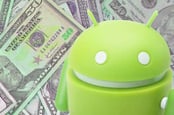This article is more than 1 year old
Oracle vs Google: No, the Supreme Court did not say APIs aren't copyright – and that's a good thing
Anyone wanting to bring a similar case in the future will have to be very, very bold and very, very rich
Column You won't be paying an Oracle tax on your next Android phone. After 10 years of Big Red claiming dibs on Android internals and Google telling them to GTFO, the legals have finally been settled by the US Supreme Court. Google has won.
The case was in many ways a classic troll. Way back when, Google thought Java SE would be a good platform to build its new Android phone around. That didn't work out, thank your favourite deity, so Google wrote its own platform with just enough Java structure to bring caffeinated programmers – of whom there were millions – along for the ride.
Everyone was happy until Oracle turned up. It fancied a new revenue line for the profit centre it called its legal department. Looking around, Oracle discovered and hauled away the dying Sun with – aha – intellectual property that could be weaponised. Most notably, Google's little shards of Java API. There were other things too, like patents, but they soon fell by the wayside. As the court case crept up the American legal system, it became widely understood to be about whether you can copyright APIs. Oracle said yes, and Google had infringed that copyright. Google said no, and anyway even if it had, the "fair use" aspect of copyright applied.

Over a decade on, and millions in legal fees, Supreme Court rules for Google over Oracle in Java API legal war
READ MOREFor a reasonably obscure intersection of law and coding, this case assumed enormous importance. Rightly so. If APIs were copyrightable, IBM could have closed down the PC clone industry at birth. It and Microsoft in turn would be open to a case from earlier microcomputer makers and Digital Research, both of whom could point to amazing similarities between their APIs and those in the IBM BIOS and Microsoft's MS-DOS.
In fact, most of what we now think of as open, competitive computing could not have evolved. You wouldn't have been able to build an alternative component, hardware or software, that used the API of the thing it replaced – not without permission. Even using an API in an application might be problematic.
The entire industry has operated on the assumption that APIs aren't copyright. Does this mean that APIs can't be copyrighted? No. It means that no court has decided whether they can or cannot. And although Google asked the Supreme Court to finally declare for freedom, the court refused – saying instead that even if "for the sake of argument" APIs could be copyright, Google's defence of "fair use" was upheld. (You can and should read the court's decision [PDF], which explains all of this in admirably clear language.)
Why no decision on APIs?
You may think this a missed opportunity to defuse a nuclear warhead at the heart of modern computing, and you'd be right. The court could easily have said that APIs did not qualify for copyright protection, and that would have been that. If Google had asked for relief on those grounds alone, perhaps it might even have happened. But Google did a belt-and-braces defence, and the Supremes thought the belt good enough.
The decision did make two points about the API copyright issue. It listed all the reasons under US copyright law why APIs might not qualify – you can't copyright process, or mechanism, or function, and these are all things APIs are. The court also said that as the world of technology was changing very quickly, it wasn't a good idea to make rules before they're really needed. This decision didn't need to be made for this case so it wasn't.
The industry has operated on the assumption that APIs can't be copyrighted and by now there are many decades of examples where free access to APIs have advanced technology
The results are also twofold. The industry has operated on the assumption that APIs can't be copyrighted and by now there are many decades of examples where free access to APIs have advanced technology, activated markets, and encouraged tons of innovation: things that copyright law is designed to encourage, as the court decision noted more than once.
The other implication of leaving the nuclear weapon untouched is that it may not be just the bad guys who get to use it. If APIs had been copyright from the dawn of CPU time, free and open source as we know it would have been closed down. But now FOSS has uncharted oceans of APIs of its own that, if copyright is deemed applicable in the future, can be brought into the permissive licensing regime and protected alongside everything else. It would still be a very bad idea, but there is now a balance of power.
The Supreme Court has done a very fine job of understanding APIs and reached a wise decision about Google, but it knows enough not to claim it can see into the future.
In any case, the signals are clear enough. The unprotected API is a key part of the innovation that keeps technology advancing.
Oracle has lost its expensive, politically damaging, and thoroughly reprehensible gamble, further tarnishing its image as an unsavoury guest at the feast. And anyone in the future who wants to use API copyright to pull cash out of inventions it did not create and has no interest in furthering will have to be very, very bold and very, very rich to ignore the warnings that Oracle vs Google has left in the landscape. We're safe for a few years yet. ®
